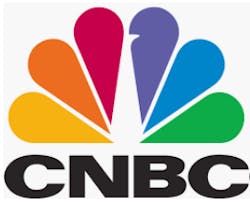CNBC's Leslie Josephs: Wall Street Expects Boeing to Take Another Big, Ugly Charge on 737 Max. BofA Estimates Total Cost of Crisis as High as $20 billion
KEY POINTS
- Boeing’s 737 Max crisis worsened with a production shut down, layoffs and scathing internal emails.
- Boeing’s bestselling aircraft have been grounded since March after the second of two crashes that killed 346 people.
- New CEO Dave Calhoun will face investors on his first earnings call on Jan. 29.
A year ago, Boeing posted record revenues topping $100 billion with hopes of delivering a chart-topping number of airplanes in 2019, including hundreds of 737 Max jetliners.
The news isn’t going to be so rosy on its fourth-quarter earnings call this year. Those bestselling planes were grounded worldwide in March after the second of two fatal crashes that claimed 346 lives. The crisis cost former CEO Dennis Muilenburg his job, prompted Boeing to suspend production of the planes, drove down orders to the lowest level in decades, hurt its supply chain, and wracked up costs that are now around $10 billion. Wall Street is expecting more bad news.
The Jan. 29 earnings call will be the first for new CEO Dave Calhoun, who took the helm on Monday, days after the company released a trove of shocking internal messages that showed employees dissing regulators and airlines and boasting about getting them to approve less time-consuming training. One showed employees complaining that Lion Air, the operator of the first 737 Max that crashed, wanted simulator training for pilots before they flew the planes.
Calhoun is tasked with cleaning up Boeing’s culture, improving employee morale and repairing damaged relationships with regulators and airlines.
“Many of our stakeholders are rightly disappointed in us, and it’s our job to repair these vital relationships,” Calhoun told Boeing employees on his first day. “We’ll do so through a recommitment to transparency and by meeting and exceeding their expectations. We will listen, seek feedback, and respond — appropriately, urgently and respectfully.”
Jeff Windau, industrials analyst at Edward Jones, said he hopes the call will shed some light on the company.
“It would be nice to get some candid comments,” he said. “I’m not expecting a date [of the return to service] but it would be nice to get some indication where they’re at.”
Several Wall Street analysts now expect Boeing, which reports full-year and fourth-quarter earnings on Jan. 29, to take additional charges related to the troubled airplane. The company took a $5.6 billion pretax charge in July to compensate airlines and other customers for the grounding, which is now in its 11th month.
“They’re going to have to pay more,” said Ron Epstein, aerospace analyst at Bank of America Merrill Lynch. He estimates the total cost of the grounding could reach $20 billion — excluding any settlements from lawsuits from crash victims’ families — if the planes return by June or July. Epstein estimates that about 40% of Boeing’s profits last year came from the Max.
Moody’s Investors Service said it was putting Boeing’s debt on a review for a possible downgrade, less than a month after cutting its credit rating by one-notch, as the crisis wears on longer than expected. The lower the credit rating, the more expensive it is for Boeing to borrow. Boeing, which declined to comment on a potential charge, has previously said it would tap the debt markets if it needs more cash to cover the costs of the crisis.
Sheila Kahyaoglu, aerospace and defense analyst at Jefferies, estimated this week that the charges for aircraft customers’ compensation is likely to rise to $11 billion, and that some of that will be reported later this month. That’s assuming the planes return to service in April, she said.
The Wall Street estimates for its earnings vary widely — from a loss of 23 cents a share to a profit of as much as $2.52 a share, according to analysts polled by Refinitiv. On average, analysts expect the Chicago-based company to report a profit of $1.53 a share — a 72% decline from a year earlier. They estimated a more than 26% drop in revenue to $20.8 billion.
Earlier this month, Boeing threw airline customers another curve ball: It’s recommending additional simulator training for pilots on the Max, a reverse of its previous stance and a step that promises to further delay the planes return to service and drive up costs.
As of Thursday, all U.S. airlines with Maxes in their fleets — American, Southwest and United — have pulled the planes from their schedules until early June, a delay that’s threatening to last until the peak travel season of late spring and the summer.
Analysts are also looking for news on how Boeing will manage its supply chain. Spirit Aerosystems, which makes fuselages and other parts for the planes, announced initial job cuts of 2,800 people last week. Moody’s downgraded its debt to junk territory.
Even the planned pause in production won’t stop the cash drain and will cost Boeing $1 billion a month, estimates J.P. Morgan.
“It doesn’t give you the warm and fuzzies when Spirit lays off 2,800 people,” said BofA’s Epstein. Suppliers are walking a tightrope with the 737 Max, because they don’t want to lack workers when Boeing can resume production. “It’s a tight job market and I’m sure there are a lot to companies that would like to hire them,” Epstein added.
Investors are also closely watching Calhoun for cues about Boeing’s bigger picture. The company has faced problems with its KC-46 refueling tanker. Because it’s hobbled by the 737 Max issues, Boeing hasn’t been able to move forward with a new middle-market airplane, giving a bigger lead to rival Airbus, which recently won orders for its forthcoming long-range, single-aisle plane from airlines including American and United. And the scrutiny of the Max could become more time consuming when regulators review its wide-body Boeing 777X.
